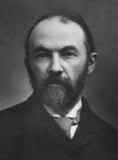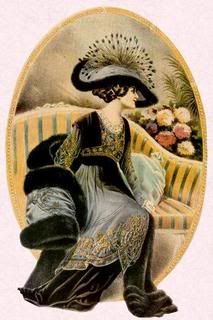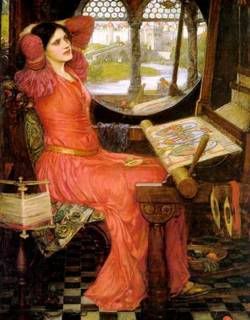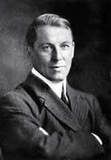Your Favourite Poetry
That's beautiful! Wordsworth's love of nature is so beautifully expressed there. ![]()
Kipling's 'If' reminded me of this one:-
Desiderata
Go placidly amid the noise and the haste,
and remember what peace there may be in silence.
As far as possible, without surrender,
be on good terms with all persons.
Speak your truth quietly and clearly;
and listen to others,
even to the dull and the ignorant;
they too have their story.
Avoid loud and aggressive persons;
they are vexatious to the spirit.
If you compare yourself with others,
you may become vain or bitter,
for always there will be greater and lesser persons than yourself.
Enjoy your achievements as well as your plans.
Keep interested in your own career, however humble;
it is a real possession in the changing fortunes of time.
Exercise caution in your business affairs,
for the world is full of trickery.
But let this not blind you to what virtue there is;
many persons strive for high ideals,
and everywhere life is full of heroism.
Be yourself. Especially do not feign affection.
Neither be cynical about love,
for in the face of all aridity and disenchantment,
it is as perennial as the grass.
Take kindly the counsel of the years,
gracefully surrendering the things of youth.
Nurture strength of spirit to shield you in sudden misfortune.
But do not distress yourself with dark imaginings.
Many fears are born of fatigue and loneliness.
Beyond a wholesome discipline,
be gentle with yourself.
You are a child of the universe
no less than the trees and the stars;
you have a right to be here.
And whether or not it is clear to you,
no doubt the universe is unfolding as it should.
Therefore be at peace with God,
whatever you conceive Him to be.
And whatever your labors and aspirations,
in the noisy confusion of life,
keep peace in your soul.
With all its sham, drudgery, and broken dreams,
it is still a beautiful world.
Be cheerful. Strive to be happy.

THE RUINED MAID
by: Thomas Hardy (1840-1928)

" 'Melia, my dear, this does everything crown!
Who could have supposed I should meet you in Town?
And whence such fair garments, such prosperi-ty?"--
"O didn't you know I'd been ruined?" said she.
"You left us in tatters, without shoes or socks,
Tired of digging potatoes, and spudding up docks;
And now you've gay bracelets and bright feathers three!"--
"Yes: that's how we dress when we're ruined," said she.
-- "At home in the barton you said `thee' and `thou,'
And `thik oon,' and `theäs oon,' and `t'other'; but now
Your talking quite fits 'ee for high compa-ny!"--
"Some polish is gained with one's ruin," said she.
-- "Your hands were like paws then, your face blue and bleak
But now I'm bewitched by your delicate cheek,
And your little gloves fit as on any la-dy!"--
"We never do work when we're ruined," said she.
-- "You used to call home-life a hag-ridden dream,
And you'd sigh, and you'd sock; but at present you seem
To know not of megrims or melancho-ly!"--
"True. One's pretty lively when ruined," said she.
-- "I wish I had feathers, a fine sweeping gown,
And a delicate face, and could strut about Town!"--
"My dear -- a raw country girl, such as you be,
Cannot quite expect that. You ain't ruined," said she.

Lament For The Moths
Tennessee Williams
A plague has stricken the moths, the moths are dying,
thier bodies are flakes of bronze on the carpet lying.
Enemies of the delicate everywhere
have breathed a pestilent mist into the air.
Lament for the velvety moths, for the moths were lovely.
Often their tender thoughts, for they thought of me,
eased the neurotic ills that haunt the day.
Now an invisible evil takes them away.
I move through the shadowy rooms, I cannot be still,
I must find where the treacherous killer is concealed.
Feverishly I search and still they fall
as fragile as ashes broken against a wall.
Now that the plague has taken the moths away,
who will be cooler than curtains against the day,
who will come early and softly to ease my lot
as I move through the shadowy rooms with a troubled heart?
Give them, O mother of moths and mother of men,
strength to enter the heavy world again,
for delicate were the moths and badly wanted
here in a world by mammoth figures haunted!
This Be The Verse
Philip Larkin
They f**k you up, your mum and dad.
They may not mean to, but they do.
They fill you with the faults they had
And add some extra, just for you.
But they were f****d up in their turn
By fools in old-style hats and coats,
Who half the time were soppy-stern
And half at one another's throats.
Man hands on misery to man.
It deepens like a coastal shelf.
Get out as early as you can,
And don't have any kids yourself.
Reflections
R.S. Thomas
The furies are at home
in the mirror; it is their address.
Even the clearest water,
if deep enough can drown.
Never think to surprise them.
Your face approaching ever
so friendly is the white flag
they ignore. There is no truce
with the furies. A mirror's temperature
is always at zero. Its camera
is an X-ray. It is a chalice
held out to you in
silent communion, where gaspingly
you partake of a shifting
identity never your own.
... are favourites of mine.
cruimh_shionnachain
Veteran

Joined: 22 Aug 2006
Gender: Male
Posts: 913
Location: Looking for the ubermensch
Villanelle: Charles-Marie Leconte de Lisle
Une nuit noire, par un calme, sous l'Équateur.
Le Temps, l'Étendue et le Nombre
Sont tombés du noir firmament
Dans la mer immobile et sombre.
Suaire de silence et d'ombre,
La nuit efface absolument
Le Temps, l'Étendue et le Nombre.
Tel qu'un lourd et muet décombre,
L'Esprit plonge au vide dormant,
Dans la mer immobile et sombre.
En lui-même, avec lui, tout sombre,
Souvenir, rêve, sentiment,
Le Temps, l'Étendue et le Nombre,
Dans la mer immobile et sombre.
______________________________
English translation:
One black night, it is calm, on the equator.
The Time, the Intention, and the Number
Falls in the black firmament
In the sea, immobile and somber.
Shroud of silence and of shade
The night erases all
The Time, the Intention, and the Number.
Such as one heavy and dumb
The spirit plunges with sleeping life
In the sea, immobile and somber.
In itself, with self, all somber
Memories, Dreams, Feeling
The Time, the Intention, and the Number
In the sea, immobile and somber.
_________________
I'm like an opening band for the sun.
-Pearl Jam
Apathy is not a vice, it is a relieving and downright enjoyable life-choice.
Alfred, Lord Tennyson (1809–1892)

The Lady of Shalott
On either side the river lie
Long fields of barley and of rye,
That clothe the wold and meet the sky;
And through the field the road run by
To many-tower'd Camelot;
And up and down the people go,
Gazing where the lilies blow
Round an island there below,
The island of Shalott.
Willows whiten, aspens quiver,
Little breezes dusk and shiver
Through the wave that runs for ever
By the island in the river
Flowing down to Camelot.
Four grey walls, and four grey towers,
Overlook a space of flowers,
And the silent isle imbowers
The Lady of Shalott.
By the margin, willow veil'd,
Slide the heavy barges trail'd
By slow horses; and unhail'd
The shallop flitteth silken-sail'd
Skimming down to Camelot:
But who hath seen her wave her hand?
Or at the casement seen her stand?
Or is she known in all the land,
The Lady of Shalott?
Only reapers, reaping early,
In among the bearded barley
Hear a song that echoes cheerly
From the river winding clearly;
Down to tower'd Camelot;
And by the moon the reaper weary,
Piling sheaves in uplands airy,
Listening, whispers, " 'Tis the fairy
The Lady of Shalott."
There she weaves by night and day
A magic web with colours gay.
She has heard a whisper say,
A curse is on her if she stay
To look down to Camelot.
She knows not what the curse may be,
And so she weaveth steadily,
And little other care hath she,
The Lady of Shalott.
And moving through a mirror clear
That hangs before her all the year,
Shadows of the world appear.
There she sees the highway near
Winding down to Camelot;
There the river eddy whirls,
And there the surly village churls,
And the red cloaks of market girls
Pass onward from Shalott.
Sometimes a troop of damsels glad,
An abbot on an ambling pad,
Sometimes a curly shepherd lad,
Or long-hair'd page in crimson clad
Goes by to tower'd Camelot;
And sometimes through the mirror blue
The knights come riding two and two.
She hath no loyal Knight and true,
The Lady of Shalott.
But in her web she still delights
To weave the mirror's magic sights,
For often through the silent nights
A funeral, with plumes and lights
And music, went to Camelot;
Or when the Moon was overhead,
Came two young lovers lately wed.
"I am half sick of shadows," said
The Lady of Shalott.
A bow-shot from her bower-eaves,
He rode between the barley sheaves,
The sun came dazzling thro' the leaves,
And flamed upon the brazen greaves
Of bold Sir Lancelot.
A red-cross knight for ever kneel'd
To a lady in his shield,
That sparkled on the yellow field,
Beside remote Shalott.
The gemmy bridle glitter'd free,
Like to some branch of stars we see
Hung in the golden Galaxy.
The bridle bells rang merrily
As he rode down to Camelot:
And from his blazon'd baldric slung
A mighty silver bugle hung,
And as he rode his armor rung
Beside remote Shalott.
All in the blue unclouded weather
Thick-jewell'd shone the saddle-leather,
The helmet and the helmet-feather
Burn'd like one burning flame together,
As he rode down to Camelot.
As often thro' the purple night,
Below the starry clusters bright,
Some bearded meteor, burning bright,
Moves over still Shalott.
His broad clear brow in sunlight glow'd;
On burnish'd hooves his war-horse trode;
From underneath his helmet flow'd
His coal-black curls as on he rode,
As he rode down to Camelot.
From the bank and from the river
He flashed into the crystal mirror,
"Tirra lirra," by the river
Sang Sir Lancelot.
She left the web, she left the loom,
She made three paces through the room,
She saw the water-lily bloom,
She saw the helmet and the plume,
She look'd down to Camelot.
Out flew the web and floated wide;
The mirror crack'd from side to side;
"The curse is come upon me," cried
The Lady of Shalott.
In the stormy east-wind straining,
The pale yellow woods were waning,
The broad stream in his banks complaining.
Heavily the low sky raining
Over tower'd Camelot;
Down she came and found a boat
Beneath a willow left afloat,
And around about the prow she wrote
The Lady of Shalott.
And down the river's dim expanse
Like some bold seer in a trance,
Seeing all his own mischance --
With a glassy countenance
Did she look to Camelot.
And at the closing of the day
She loosed the chain, and down she lay;
The broad stream bore her far away,
The Lady of Shalott.
Lying, robed in snowy white
That loosely flew to left and right --
The leaves upon her falling light --
Thro' the noises of the night,
She floated down to Camelot:
And as the boat-head wound along
The willowy hills and fields among,
They heard her singing her last song,
The Lady of Shalott.
Heard a carol, mournful, holy,
Chanted loudly, chanted lowly,
Till her blood was frozen slowly,
And her eyes were darkened wholly,
Turn'd to tower'd Camelot.
For ere she reach'd upon the tide
The first house by the water-side,
Singing in her song she died,
The Lady of Shalott.
Under tower and balcony,
By garden-wall and gallery,
A gleaming shape she floated by,
Dead-pale between the houses high,
Silent into Camelot.
Out upon the wharfs they came,
Knight and Burgher, Lord and Dame,
And around the prow they read her name,
The Lady of Shalott.
Who is this? And what is here?
And in the lighted palace near
Died the sound of royal cheer;
And they crossed themselves for fear,
All the Knights at Camelot;
But Lancelot mused a little space
He said, "She has a lovely face;
God in his mercy lend her grace,
The Lady of Shalott."

GUS THE THEATRE CAT
by T S Eliot
Gus is the Cat at the Theatre Door.
His name, as I ought to have told you before,
Is really Asparagus. That's such a fuss
To pronounce, that we usually call him just Gus.
His coat's very shabby, he's thin as a rake,
And he suffers from palsy that makes his paw shake.
Yet he was, in his youth, quite the smartest of Cats--
But no longer a terror to mice and to rats.
For he isn't the Cat that he was in his prime;
Though his name was quite famous, he says, in its time.
And whenever he joins his friends at their club
(Which takes place at the back of the neighbouring pub)
He loves to regale them, if someone else pays,
With anecdotes drawn from his palmiest days.
For he once was a Star of the highest degree--
He has acted with Irving, he's acted with Tree.
And he likes to relate his success on the Halls,
Where the Gallery once gave him seven cat-calls.
But his grandest creation, as he loves to tell,
Was Firefrorefiddle, the Fiend of the Fell.
"I have played," so he says, "every possible part,
And I used to know seventy speeches by heart.
I'd extemporize back-chat, I knew how to gag,
And I knew how to let the cat out of the bag.
I knew how to act with my back and my tail;
With an hour of rehearsal, I never could fail.
I'd a voice that would soften the hardest of hearts,
Whether I took the lead, or in character parts.
I have sat by the bedside of poor Little Nell;
When the Curfew was rung, then I swung on the bell.
In the Pantomime season I never fell flat,
And I once understudied Dick Whittington's Cat.
But my grandest creation, as history will tell,
Was Firefrorefiddle, the Fiend of the Fell."
Then, if someone will give him a toothful of gin,
He will tell how he once played a part in East Lynne.
At a Shakespeare performance he once walked on pat,
When some actor suggested the need for a cat.
He once played a Tiger--could do it again--
Which an Indian Colonel purused down a drain.
And he thinks that he still can, much better than most,
Produce blood-curdling noises to bring on the Ghost.
And he once crossed the stage on a telegraph wire,
To rescue a child when a house was on fire.
And he says: "Now then kittens, they do not get trained
As we did in the days when Victoria reigned.
They never get drilled in a regular troupe,
And they think they are smart, just to jump through a hoop."
And he'll say, as he scratches himself with his claws,
"Well, the Theatre's certainly not what it was.
These modern productions are all very well,
But there's nothing to equal, from what I hear tell,
That moment of mystery
When I made history
As Firefrorefiddle, the Fiend of the Fell."

THE RAVEN
by Edgar Allan Poe
(1845)
Once upon a midnight dreary, while I pondered, weak and weary,
Over many a quaint and curious volume of forgotten lore,
While I nodded, nearly napping, suddenly there came a tapping,
As of some one gently rapping, rapping at my chamber door.
"'Tis some visitor," I muttered, "tapping at my chamber door-
Only this, and nothing more."
Ah, distinctly I remember it was in the bleak December,
And each separate dying ember wrought its ghost upon the floor.
Eagerly I wished the morrow;- vainly I had sought to borrow
From my books surcease of sorrow- sorrow for the lost Lenore-
For the rare and radiant maiden whom the angels name Lenore-
Nameless here for evermore.
And the silken sad uncertain rustling of each purple curtain
Thrilled me- filled me with fantastic terrors never felt before;
So that now, to still the beating of my heart, I stood repeating,
"'Tis some visitor entreating entrance at my chamber door-
Some late visitor entreating entrance at my chamber door;-
This it is, and nothing more."
Presently my soul grew stronger; hesitating then no longer,
"Sir," said I, "or Madam, truly your forgiveness I implore;
But the fact is I was napping, and so gently you came rapping,
And so faintly you came tapping, tapping at my chamber door,
That I scarce was sure I heard you"- here I opened wide the door;-
Darkness there, and nothing more.
Deep into that darkness peering, long I stood there wondering,
fearing,
Doubting, dreaming dreams no mortals ever dared to dream before;
But the silence was unbroken, and the stillness gave no token,
And the only word there spoken was the whispered word, "Lenore!"
This I whispered, and an echo murmured back the word, "Lenore!"-
Merely this, and nothing more.
Back into the chamber turning, all my soul within me burning,
Soon again I heard a tapping somewhat louder than before.
"Surely," said I, "surely that is something at my window lattice:
Let me see, then, what thereat is, and this mystery explore-
Let my heart be still a moment and this mystery explore;-
'Tis the wind and nothing more."
Open here I flung the shutter, when, with many a flirt and
flutter,
In there stepped a stately raven of the saintly days of yore;
Not the least obeisance made he; not a minute stopped or stayed
he;
But, with mien of lord or lady, perched above my chamber door-
Perched upon a bust of Pallas just above my chamber door-
Perched, and sat, and nothing more.
Then this ebony bird beguiling my sad fancy into smiling,
By the grave and stern decorum of the countenance it wore.
"Though thy crest be shorn and shaven, thou," I said, "art sure no
craven,
Ghastly grim and ancient raven wandering from the Nightly shore-
Tell me what thy lordly name is on the Night's Plutonian shore!"
Quoth the Raven, "Nevermore."
Much I marvelled this ungainly fowl to hear discourse so plainly,
Though its answer little meaning- little relevancy bore;
For we cannot help agreeing that no living human being
Ever yet was blest with seeing bird above his chamber door-
Bird or beast upon the sculptured bust above his chamber door,
With such name as "Nevermore."
But the raven, sitting lonely on the placid bust, spoke only
That one word, as if his soul in that one word he did outpour.
Nothing further then he uttered- not a feather then he fluttered-
Till I scarcely more than muttered, "other friends have flown
before-
On the morrow he will leave me, as my hopes have flown before."
Then the bird said, "Nevermore."
Startled at the stillness broken by reply so aptly spoken,
"Doubtless," said I, "what it utters is its only stock and store,
Caught from some unhappy master whom unmerciful Disaster
Followed fast and followed faster till his songs one burden bore-
Till the dirges of his Hope that melancholy burden bore
Of 'Never- nevermore'."
But the Raven still beguiling all my fancy into smiling,
Straight I wheeled a cushioned seat in front of bird, and bust and
door;
Then upon the velvet sinking, I betook myself to linking
Fancy unto fancy, thinking what this ominous bird of yore-
What this grim, ungainly, ghastly, gaunt and ominous bird of yore
Meant in croaking "Nevermore."
This I sat engaged in guessing, but no syllable expressing
To the fowl whose fiery eyes now burned into my bosom's core;
This and more I sat divining, with my head at ease reclining
On the cushion's velvet lining that the lamplight gloated o'er,
But whose velvet violet lining with the lamplight gloating o'er,
She shall press, ah, nevermore!
Then methought the air grew denser, perfumed from an unseen censer
Swung by Seraphim whose footfalls tinkled on the tufted floor.
"Wretch," I cried, "thy God hath lent thee- by these angels he
hath sent thee
Respite- respite and nepenthe, from thy memories of Lenore!
Quaff, oh quaff this kind nepenthe and forget this lost Lenore!"
Quoth the Raven, "Nevermore."
"Prophet!" said I, "thing of evil!- prophet still, if bird or
devil!-
Whether Tempter sent, or whether tempest tossed thee here ashore,
Desolate yet all undaunted, on this desert land enchanted-
On this home by horror haunted- tell me truly, I implore-
Is there- is there balm in Gilead?- tell me- tell me, I implore!"
Quoth the Raven, "Nevermore."
"Prophet!" said I, "thing of evil- prophet still, if bird or
devil!
By that Heaven that bends above us- by that God we both adore-
Tell this soul with sorrow laden if, within the distant Aidenn,
It shall clasp a sainted maiden whom the angels name Lenore-
Clasp a rare and radiant maiden whom the angels name Lenore."
Quoth the Raven, "Nevermore."
"Be that word our sign in parting, bird or fiend," I shrieked,
upstarting-
"Get thee back into the tempest and the Night's Plutonian shore!
Leave no black plume as a token of that lie thy soul hath spoken!
Leave my loneliness unbroken!- quit the bust above my door!
Take thy beak from out my heart, and take thy form from off my
door!"
Quoth the Raven, "Nevermore."
And the Raven, never flitting, still is sitting, still is sitting
On the pallid bust of Pallas just above my chamber door;
And his eyes have all the seeming of a demon's that is dreaming,
And the lamplight o'er him streaming throws his shadow on the
floor;
And my soul from out that shadow that lies floating on the floor
Shall be lifted- nevermore!
I love Emily Dickinson; her poems are short but powerful.
The Heart Asks Pleasure first:
The heart asks pleasure first
And then, excuse from pain-
And then, those little anodynes
That deaden suffering;
And then, to go to sleep;
And then, if it should be
The will of its Inquisitor,
The liberty to die.
_________________
Only a miracle can save me; too bad I don't believe in miracles.
![]() Great poems! ~ thanks to everyone who has shared their favourites, keep 'em coming
Great poems! ~ thanks to everyone who has shared their favourites, keep 'em coming ![]()
Here's one for all the nature lovers.
Robert Service

The Call of the Wild
Have you gazed on naked grandeur where there's nothing else to gaze on,
Set pieces and drop-curtain scenes galore,
Big mountains heaved to heaven, which the blinding sunsets blazon,
Black canyons where the rapids rip and roar?
Have you swept the visioned valley with the green stream streaking through it,
Searched the Vastness for a something you have lost?
Have you strung your soul to silence? Then for God's sake go and do it;
Hear the challenge, learn the lesson, pay the cost.
Have you wandered in the wilderness, the sagebrush desolation,
The bunch-grass levels where the cattle graze?
Have you whistled bits of rag-time at the end of all creation,
And learned to know the desert's little ways?
Have you camped upon the foothills, have you galloped o'er the ranges,
Have you roamed the arid sun-lands through and through?
Have you chummed up with the mesa? Do you know its moods and changes?
Then listen to the Wild -- it's calling you.
Have you known the Great White Silence, not a snow-gemmed twig aquiver?
(Eternal truths that shame our soothing lies).
Have you broken trail on snowshoes? mushed your huskies up the river,
Dared the unknown, led the way, and clutched the prize?
Have you marked the map's void spaces, mingled with the mongrel races,
Felt the savage strength of brute in every thew?
And though grim as hell the worst is, can you round it off with curses?
Then hearken to the Wild -- it's wanting you.
Have you suffered, starved and triumphed, groveled down, yet grasped at glory,
Grown bigger in the bigness of the whole?
"Done things" just for the doing, letting babblers tell the story,
Seeing through the nice veneer the naked soul?
Have you seen God in His splendors, heard the text that nature renders?
(You'll never hear it in the family pew).
The simple things, the true things, the silent men who do things --
Then listen to the Wild -- it's calling you.
They have cradled you in custom, they have primed you with their preaching,
They have soaked you in convention through and through;
They have put you in a showcase; you're a credit to their teaching --
But can't you hear the Wild? -- it's calling you.
Let us probe the silent places, let us seek what luck betide us;
Let us journey to a lonely land I know.
There's a whisper on the night-wind, there's a star agleam to guide us,
And the Wild is calling, calling. . .let us go.

I like a lot of Simon Armitage's poems.
Apparently he's a bit of an a***hole though -> my english teacher was talking about when she went to a poetry reading of his (or something like that) when she was 17 (he was 35) and he made a pass at her (or something to that effect).
AnonymousAnonymous
Veteran

Joined: 23 Nov 2006
Age: 35
Gender: Male
Posts: 72,600
Location: Portland, Oregon
"Elm" by Sylvia Plath
I know the bottom, she says. I know it with my great tap root:
It is what you fear.
I do not fear it: I have been there.
Is it the sea you hear in me,
Its dissatisfactions?
Or the voice of nothing, that was your madness?
Love is a shadow.
How you lie and cry after it
Listen: these are its hooves: it has gone off, like a horse.
All night I shall gallop thus, impetuously,
Till your head is a stone, your pillow a little turf,
Echoing, echoing.
Or shall I bring you the sound of poisons?
This is rain now, this big hush.
And this is the fruit of it: tin-white, like arsenic
I have suffered the atrocity of sunsets.
Scorched to the root
My red filaments burn and stand, a hand of wires.
Now I break up in pieces that fly about like clubs.
A wind of such violence
Will tolerate no bystanding: I must shriek.
The moon, also, is merciless: she would drag me
Cruelly, being barren.
Her radiance scathes me. Or perhaps I have caught her.
I let her go. I let her go
Diminished and flat, as after radical surgery.
How your bad dreams possess and endow me.
I am inhabited by a cry.
Nightly it flaps out
Looking, with its hooks, for something to love.
I am terrified by this dark thing
That sleeps in me;
All day I feel its soft, feathery turnings, its malignity.
Clouds pass and disperse.
Are those the faces of love, those pale irretrievables?
Is it for such I agitate my heart?
I am incapable of more knowledge.
What is this, this face
So murderous in its strangle of branches? -
Its snaky acids hiss.
It petrifies the will. These are the isolate, slow faults
That kill, that kill, that kill.
Very beautiful poem.
That's a wonderful poem AnonymousAnonymous.
Here's another one by Sylvia Plath that I like.

Conversation Among the Ruins
Through portico of my elegant house you stalk
With your wild furies, disturbing garlands of fruit
And the fabulous lutes and peacocks, rending the net
Of all decorum which holds the whirlwind back.
Now, rich order of walls is fallen; rooks croak
Above the appalling ruin; in bleak light
Of your stormy eye, magic takes flight
Like a daunted witch, quitting castle when real days break.
Fractured pillars frame prospects of rock;
While you stand heroic in coat and tie, I sit
Composed in Grecian tunic and psyche-knot,
Rooted to your black look, the play turned tragic:
Which such blight wrought on our bankrupt estate,
What ceremony of words can patch the havoc?

AnonymousAnonymous
Veteran

Joined: 23 Nov 2006
Age: 35
Gender: Male
Posts: 72,600
Location: Portland, Oregon
Here's another one by Sylvia Plath that I like.

Conversation Among the Ruins
Through portico of my elegant house you stalk
With your wild furies, disturbing garlands of fruit
And the fabulous lutes and peacocks, rending the net
Of all decorum which holds the whirlwind back.
Now, rich order of walls is fallen; rooks croak
Above the appalling ruin; in bleak light
Of your stormy eye, magic takes flight
Like a daunted witch, quitting castle when real days break.
Fractured pillars frame prospects of rock;
While you stand heroic in coat and tie, I sit
Composed in Grecian tunic and psyche-knot,
Rooted to your black look, the play turned tragic:
Which such blight wrought on our bankrupt estate,
What ceremony of words can patch the havoc?

That is such a lovely poem Starr!
Most of her poems were similes or metaphors for what she was feeling at that moment.







